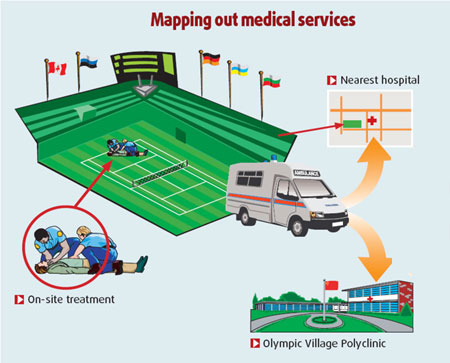OLYMPICS/ flash
Guests in for a treat
By Cui Xiaohuo (China Daily)
Updated: 2007-08-17 11:20
With less than one year to go, doctors and nurses in the Olympic city and co-host cities are in a race against time to get themselves ready for the Beijing Games.
With most of the medical infrastructure already in place, the big challenge now rests on the shoulders of the staff.

"I've been to hospitals in Japan and the Olympic hospitals in Sydney and there are many aspects where we still have to catch up," said Wang Weigang, chief physician at the International Medical Department at one of the Olympic-designated hospitals in Beijing.
"Most Chinese hospitals still have a lot to learn from the West," he told China Daily last month.
Dr Wang works for China-Japan Friendship Hospital, which has an international department and will serve as the designated hospital for athletes during the Olympics. But even it has issues to take care of in the coming days.
"It's not so easy to use the services here," said Marina Petrova from Latvia. "I don't understand the procedures. They just ask me to go here and there."
The international department, tucked away in the northeast corner of the hospital, is not clearly signposted. The English version of its computerized medical procedures is out of service and the hospital does not have access to international phone lines to call other doctors when needed.
Earlier, staff at the nurses' desk had difficulties giving Petrova clear English directions. When she asked where she should go to pay the bill, she was met with blank faces. Adding to the confusion, nothing was clearly explained to her.
"The doctor talked to me for less than two minutes and here I am at the cashier," said Marina. "Now I wonder whether I have enough money to pay for it."
She paid 200 yuan ($26.4) for the doctor's fee and another 280 yuan for a blood test.
"It's hard to achieve barrier-free communication yet," said Wang Weigang. "Through the Olympics, we hope to teach English to doctors and nurses and have some who can speak Japanese, German, Spanish and French. These doctors will be available when there is a patient from one of those countries."
But language may not be the top issue here. With the country's population lacking access to sufficient medical services, international guests may experience similiar problems.
Expatriates in Beijing are often used to more private treatment, and can feel unsettled by scenes of patients wandering around in public with IV drips dangling from their arms, or crowds of people waiting for mass blood tests in one room.
"Everything is completely different here," said Sveta Yankovskaya, public relations manager of Beijing's United Family Hospital.
"In institutions abroad, a private doctor sees about 15 outpatients each day, while here it can be as many as one hundred," said Yankovskaya, saying that the disproportionate number of patients and doctors in China completely changes the playing field.
|